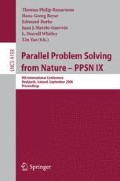Abstract
Rheological structure-property models play a crucial role in the manufacturing and processing of polymers. Traditionally rheological models are developed by design of experiments that measure a rheological property as a function of the moments of molar mass distributions. These empirical models lack the capacity to apply to a wide range of distributions due the limited availability of experimental data. In recent years fundamental models were developed to satisfy a wider range of distributions, but they are in terms of variables not readily available during processing or manufacturing. Genetic programming can be used to bridge the gap between the practical, but limited, empirical models and the more general, but less practical, fundamental models. This is a novel approach of generating rheological models that are both practical and valid for a wide set of distributions.
Access this chapter
Tax calculation will be finalised at checkout
Purchases are for personal use only
Preview
Unable to display preview. Download preview PDF.
References
Osswald, T.A., Menges, G.: Materials science of polymers for engineers, 2nd edn., Hanser Gardner, Cincinnati OH (2003)
Macosko, C.W.: Rheology, principles, measurements, and applications. Wiley VCH, New York (1994)
Bamford, C.H., Tompa, H.: The calculation of molecular weight distributions from kinetic schemes. Trans. Faraday Soc. 50, 1097 (1954)
Van Ruymbeke, E., Keunings, R., Stphenne, V., Hagenaars, A., Bailly, C.: Evaluation of reptation models for predicting the linear viscoelastic properties of entangled linear polymers. Marcomolecules 35, 2689–2699 (2002)
Den Doelder, J.: Viscosity and compliance from molar mass distributions using double reptation. Rheology Acta (2006) (accepted)
Koza, J.: Genetic Programming. On the Programming of Computers by Means of Natural Selection. MIT Press, Cambridge (1992)
Vladislavleva, C.: Symbolic Regression via Genetic Programming. Masters thesis. Eindhoven University of Techonology, Eindhoven (2005)
Deb, K.: Multi-Objective Optimization Using Evolutionary Algorithms. Wiley, Chichester (2001)
Smits, G., Kotanchek, M.: Pareto-Front Exploitation in Symbolic Regression. In: Riolo, R., Worzel, B. (eds.) Genetic Programming Theory and Practice, Kluwer, Boston (in press, 2004)
Vapnik, V.: Statistical Learning Theory. Wiley, New York (1998)
Author information
Authors and Affiliations
Editor information
Editors and Affiliations
Rights and permissions
Copyright information
© 2006 Springer-Verlag Berlin Heidelberg
About this paper
Cite this paper
Jordaan, E., den Doelder, J., Smits, G. (2006). Novel Approach to Develop Rheological Structure-Property Relationships Using Genetic Programming. In: Runarsson, T.P., Beyer, HG., Burke, E., Merelo-Guervós, J.J., Whitley, L.D., Yao, X. (eds) Parallel Problem Solving from Nature - PPSN IX. PPSN 2006. Lecture Notes in Computer Science, vol 4193. Springer, Berlin, Heidelberg. https://doi.org/10.1007/11844297_33
Download citation
DOI: https://doi.org/10.1007/11844297_33
Publisher Name: Springer, Berlin, Heidelberg
Print ISBN: 978-3-540-38990-3
Online ISBN: 978-3-540-38991-0
eBook Packages: Computer ScienceComputer Science (R0)

